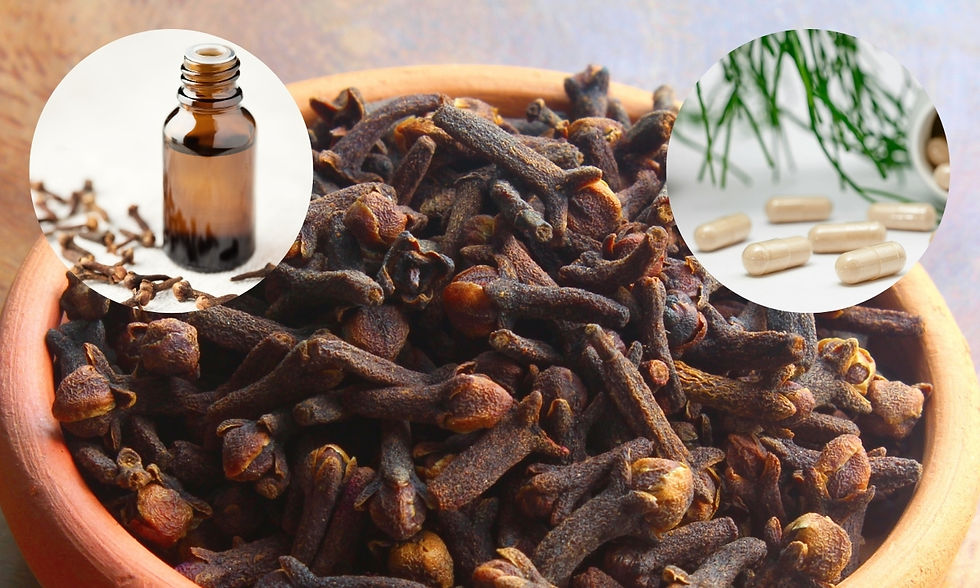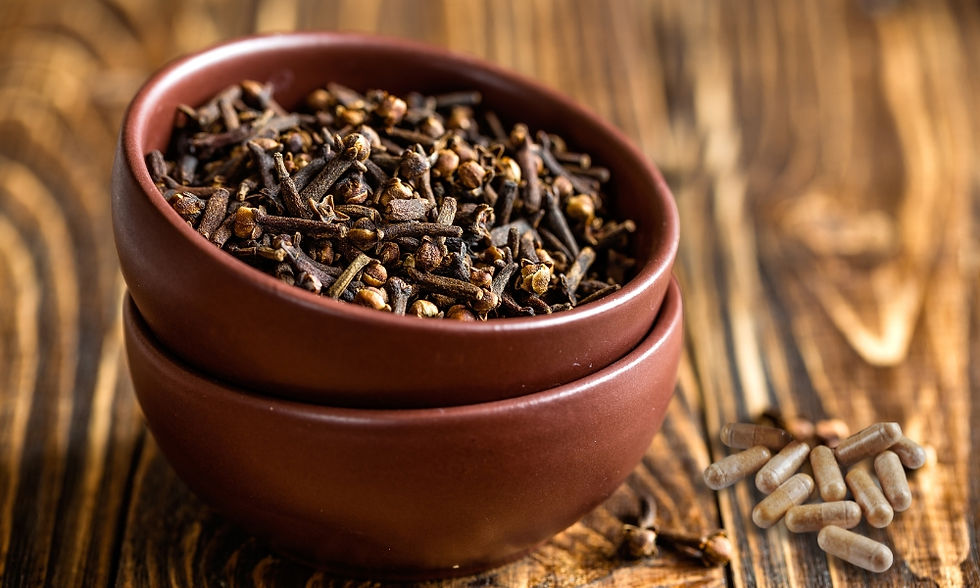Why Clove Belongs in Your Daily Routine: Top 3 Natural Uses
- Herbs around us
- Sep 9, 2025
- 5 min read
Updated: Sep 26, 2025
Clove, also known as Syzygium aromaticum, has long transcended its role as a holiday spice. While its warm, aromatic punch has earned it a place in kitchens across the world, modern herbal medicine is rediscovering clove’s wide-reaching benefits—many of which support everyday wellness. For individuals seeking a natural, plant-based addition to their routine, clove emerges as a well-researched, accessible option that delivers tangible value in small daily doses.
Whether consumed as a supplement, brewed into a calming tea, or used topically as an oil, clove supports health in ways that are as practical as they are potent. In this two-part article, we’ll explore how this mineral-rich herb enhances three key aspects of daily health: digestion, oral hygiene, and immune defense.

Image: Canva
A Legacy Rooted in Tradition and Modern Evidence
Clove’s value is not new. Traditional medicine systems such as Ayurveda, Traditional Chinese Medicine, and Unani medicine have used clove buds for centuries to relieve toothaches, freshen breath, and calm the stomach. What’s changed is our understanding. Scientific studies now affirm many of these historical uses—particularly their antimicrobial, anti-inflammatory, and antioxidant effects.
A 2020 review in Frontiers in Pharmacology noted that clove extract contains a rich supply of eugenol, a bioactive compound that contributes to clove’s antibacterial and antifungal properties. From digestive comfort to oral wellness, eugenol makes clove a star among natural remedies.
1. Digestive Support: From Bloating Relief to Microbiome Balance
Digestive discomfort—from bloating to slow metabolism—affects millions of people daily. Clove stands out for its dual action: it helps relieve symptoms and addresses root causes.
When consumed as a clove capsule or clove powder, this herb stimulates digestive enzymes that break down food efficiently. Eugenol’s carminative properties help reduce gas and bloating, making meals feel lighter. A 2018 animal study in the Journal of Medicinal Food found that clove extract helped reduce inflammation in the gastrointestinal tract, improving intestinal health markers.
For many herbal supplement users, clove tea is a gentle alternative. Sipping warm clove tea before or after meals not only soothes the stomach but also supports a healthier gut environment. Unlike synthetic antacids that disrupt microbiota balance, clove naturally encourages microbial diversity.
People with more chronic symptoms—such as slow digestion or occasional acid reflux—often benefit from clove supplements standardized to contain high eugenol content. These are easier to incorporate daily and offer more measurable dosage control than culinary clove alone.
2. Oral Health: Nature’s Antiseptic at Work
Oral hygiene is not just about aesthetics—it’s foundational to your body’s systemic health. Clove offers one of the most potent natural interventions for supporting fresh breath, gum strength, and antimicrobial protection in the mouth.
This is not folklore. Clove oil has long been used in dentistry, and even the American Dental Association recognizes its historic application in pain relief. Its main component, eugenol, provides numbing effects for mild discomfort while simultaneously killing oral pathogens.
Using clove oil capsules or a clove mouth rinse can help reduce bacterial buildup linked to plaque and gum inflammation. In a 2022 study published in the Journal of Oral Biosciences, clove oil was shown to significantly reduce the presence of Streptococcus mutans—a leading bacterium in cavity formation.
For DIY users, diluted clove oil swabbed on gums can offer fast-acting relief for sensitivity or discomfort. Alternatively, clove powder added to natural toothpaste blends can support daily oral detox.
Incorporating clove into a wellness routine for oral health is not about replacing brushing—it’s about enhancing natural defense. When used properly, it complements modern dental hygiene with botanical efficacy.
3. Immunity and Daily Resilience
We often associate immune health with vitamin C or echinacea, but clove holds quite a power in this area too. With high concentrations of antioxidants—including flavonoids and tannins—clove helps neutralize oxidative stress, the hidden driver behind fatigue, skin aging, and lowered immunity.
A 2019 study in Oxidative Medicine and Cellular Longevity ranked clove among the top five herbs richest in phenolic compounds. These antioxidants scavenge free radicals and support your body's natural detox pathways. What this means for your daily life is better resilience to environmental stressors, pollutants, and mild pathogens.
Taking clove supplements daily, especially during colder months or high-stress periods, may support the body’s adaptive response. Many U.S.-based clove capsule brands now include blends with black seed oil, turmeric, or elderberry to amplify clove’s immune-supporting effects without overwhelming the system.
Herb lovers often pair organic clove capsules with clove tea, especially before bed, to allow the anti-inflammatory compounds to circulate overnight. This gentle routine has become popular among young professionals, shift workers, and students aiming to support consistent energy without stimulants.
Comparing Forms: Clove Tea vs. Capsules vs. Oil
Choosing the right form of clove depends on your personal health goals and lifestyle. Here’s a side-by-side comparison to help you understand which format may best support your daily needs:
Clove Form | Best For | How to Use | Key Benefits | Absorption Speed |
Clove Capsules | Digestive comfort, immune support | 1–2 capsules daily with water | Convenient, measurable, long-lasting support | Moderate, extended release |
Clove Tea | Gut soothing, daily detox, light immunity | Brew 3–5 buds or 1 tsp ground clove in hot water | Gentle, calming, good for gut health | Slow, subtle onset |
Clove Oil (Diluted) | Oral health, skin care, spot relief | Apply topically with carrier oil, or use in rinses | Fast-acting, local anti-microbial effects | Fast (topical or oral mucosa) |
Each form brings something unique to your wellness toolkit. For sustained internal effects, capsules or tea are better suited. For quick external application—like gum sensitivity or blemishes—diluted clove oil is ideal.
Supporting Research
Scientific validation continues to reinforce the traditional wisdom surrounding clove use:
A study in Frontiers in Pharmacology (2020) confirmed clove’s antimicrobial and antioxidant properties, especially linked to its eugenol content.
In Oxidative Medicine and Cellular Longevity (2019), clove ranked among the top herbs for phenolic antioxidant density.
The Journal of Oral Biosciences (2022) highlighted clove oil’s impact on oral bacteria, reducing plaque-forming agents effectively.
Research in the Journal of Medicinal Food (2018) demonstrated clove’s ability to reduce gut inflammation and improve intestinal function in animal models.
These findings reinforce that clove is not just culinary—it’s a versatile wellness ingredient with science to back it up.
A Small Habit with Big Impact
Adding clove to your daily routine is not about adopting a complex regimen. It’s about leveraging one of nature’s most potent herbs in a format that fits your lifestyle—whether that’s sipping tea after dinner, popping a capsule after breakfast, or using oil to support oral hygiene.
Small, consistent steps lead to long-term health benefits. Clove gives you a natural, well-rounded foundation to support digestion, immunity, and hygiene—no matter your schedule.
References
Kamatou, G. P., Vermaak, I., & Viljoen, A. M. (2012). Eugenol—From the remote Maluku Islands to the international marketplace: A review of a remarkable and versatile molecule. Molecules, 17(6), 6953–6981.
Chaieb, K., Hajlaoui, H., Zmantar, T., et al. (2007). The chemical composition and biological activity of clove essential oil, Phytotherapy Research, 21(6), 501–506.
Duraipandiyan, V., & Ignacimuthu, S. (2007). Antibacterial and antifungal activity of Syzygium aromaticum (L.) Merr. & L.M.Perry. Asian Journal of Biological Sciences, 7(5), 657–661.
Islam, M. T., da Mata, A. M. O. F., et al. (2017). Therapeutic potential of essential oils in pain and inflammation: A review. Journal of Ethnopharmacology, 205, 1–27.
Cai, Y. Z., Sun, M., & Corke, H. (2003). Antioxidant activity of betalains from plants of the Amaranthaceae. Journal of Agricultural and Food Chemistry, 51(8), 2288–2294.
Sharma, P., & Dey, A. (2021). Clove (Syzygium aromaticum): A review on its composition, chemical properties, and its beneficial effects. Nutrients, 13(11), 4001.















